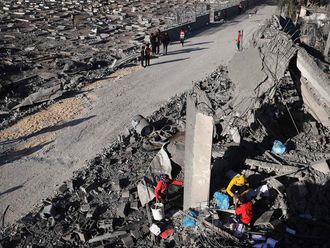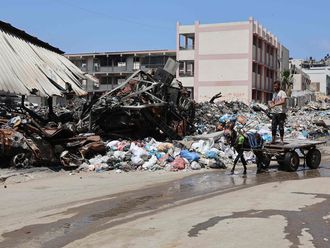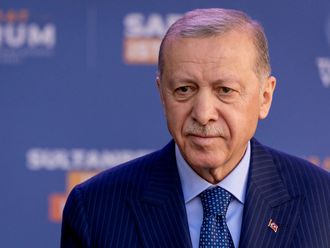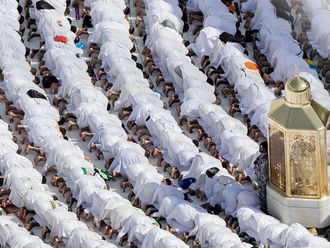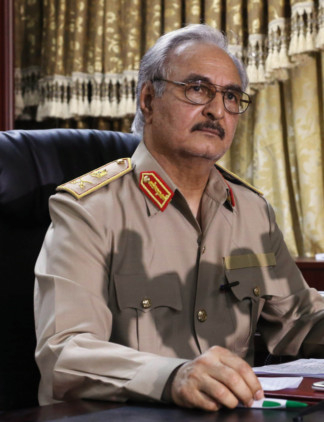
Benghazi: The road to the general’s base is filled with soldiers who salute, wear matching uniforms and drive glinting new Toyotas, in a display of martial discipline and power rare for this country.
But the soldiers’ security, for the moment, remains in doubt. The base is hidden behind a new metal gate, as wide as two roads and 25 feet tall, a hulking symbol of the threats that have gathered around the general, Khalifa Haftar, since he declared war on the country’s Islamist militia leaders and lawmakers nearly two weeks ago.
Haftar has cast himself in the role of strongman and national protector, the man who will “correct” Libya’s faltering revolution and purge the country of extremists. But he is a polarizing figure, as notorious for his ambition as for his shifting allegiances, and many people here wonder whether he will amount to more than a warlord, advancing his own narrow interests.
He has gathered a corps of soldiers, air force units and militiamen that he has declared to be the Libyan national army, and has used it to mount assaults on the bases of powerful Islamist militias in the east, including several airstrikes Wednesday. Libya’s multitude of militias have been a major focus of public anger, not least for repeatedly refusing to disarm.
And Haftar has won unexpected support for his campaign from a wide variety of political, tribal and militia leaders, forging alliances that have upended Libya’s fragile balance of power.
Thousands of Libyans, weary of the political violence that stalks their cities, have held demonstrations endorsing the goals of Haftar’s campaign, which he has named Operation Dignity. But there are also fears about what Haftar may have unleashed, in a country whose neighbours increasingly view it as a font of extremism and regional instability.
The fighting in the last two weeks has been some of the fiercest Libya has seen since Muammar Gaddafi was overthrown in 2011. At least 70 people were killed in the days following Haftar’s assault on the militias. Earlier this week, gunmen assassinated one of Libya’s most prominent newspaper editors in Benghazi, while in Tripoli, the government said assailants attempted to kill the prime minister.
The country’s foreign allies have rushed to appoint envoys to try to defuse the crisis. The United States has warned US citizens to leave the country immediately, and has sent an amphibious assault ship with 1,000 Marines to the region.
“I wish the blood had stopped after the death of Gaddafi,” said Adel Al Hassi, a former militia leader in Benghazi who now supports Haftar. “Sadly, the blood will start now,” he said.
The airstrikes Haftar ordered Wednesday were aimed at one of Benghazi’s most prominent militias - in retaliation, a spokesman said, for the killing of the newspaper editor, Muftah Buzaid.
“Every militia is responsible for the murders, and we will attack them until they surrender,” said Haftar’s deputy, Staff Brigadier Sager Al Goroushi.
In a telephone interview Wednesday, Haftar said that he had no political ambitions beyond his current campaign, which he asserted was a part of a global fight against terrorism. He has denied receiving any backing from foreign countries, as his opponents frequently say he has, but he said he would welcome foreign weapons and financial aid if he could get them.
“We are now fighting not only on behalf of Libya,” he said, “but on behalf of the whole world.”
Haftar’s military campaign has won him some concessions in Tripoli, the capital, including a pledge to hold new parliamentary elections in June. But others of his demands, including the formation of an emergency government supervised by Libya’s supreme court, have so far been ignored.
Haftar’s campaign has stoked new divisions among rival militias in western Libya, but not, so far, the kind of sustained fighting seen in the east.
For the moment, the front lines are in Benghazi. Haftar’s troops operate from several bases, including one outside the city, while the militias have generally retreated to the farmland on the outskirts of town. Fighting flares nightly around the city’s edge, with heavy weapons deployed in some areas emptied of residents.
“They have declared war on each other,” Anas Toweir, a radiologist from Benghazi, said of Haftar and the local militias. “No one is quite sure what’s going on. Everyone is hiding in their homes.”
Haftar’s allies in the east are said to include former Gaddafi army soldiers, fighters from towns east of Benghazi and federalists demanding more autonomy for the region. His opponents, including hard-core jihadist groups and mainstream Islamist brigades, grew out of the 2011 uprising and remain a powerful political bloc, referring to themselves as Libya’s “revolutionaries.”
The militia leaders have reacted with defiance to Haftar’s campaign, accusing him of fomenting a “coup” and vowing fierce resistance.
“He who has lost his dignity in Chad is not going to regain it in Benghazi,” said Esmail Sallabi, who comes from a family of prominent Islamists. “We see Haftar exactly as we saw Gaddafi.”
Still, after repeated attacks by Haftar, the Islamist militiamen seem to have lost their swagger lately, wearing balaclavas behind their checkpoints and rifling through the cars of passing motorists, sensing treachery everywhere.
They are reeling, too, from a chorus of public disapproval. Many Libyans say they have put aside their misgivings about Haftar for the moment to deal with the more dangerous scourge of the militias, which they blame for assassinations, kidnappings and other violence meant to settle old scores.
Hundreds of people attended a demonstration in support of Haftar last Friday, some of them holding pictures of relatives whom they said were killed by groups like Ansar Al Sharia, a radical militia that took part in the attack that killed the US ambassador, J. Christopher Stevens, in Benghazi in 2012.
“We don’t want to hear the word ‘revolutionary’ anymore,” said one man, a doctor who refused to give his name. “We want the police and the army. How hard is it to get that message across?’”
The United States has sent confusing signals about the standoff. The State Department has said it does not condone Haftar’s offensive, and has warned against the use of violence. At the same time, the US ambassador in Libya, Deborah Jones, said recently in Washington that she could not “condemn” Haftar’s actions, partly because he was pursuing extremist groups that Washington considers terrorist organizations.
Al Hassi, the former Benghazi militia leader, said he did not think much of Haftar. “If there was safety and security in the country, we would not have needed him,” Al Hassi said. “But he was the only person who could unify the army. That’s why I support him.”
“The battle will take a long time, and will not just be in Benghazi,” he added. “It will be in all of Libya.”


